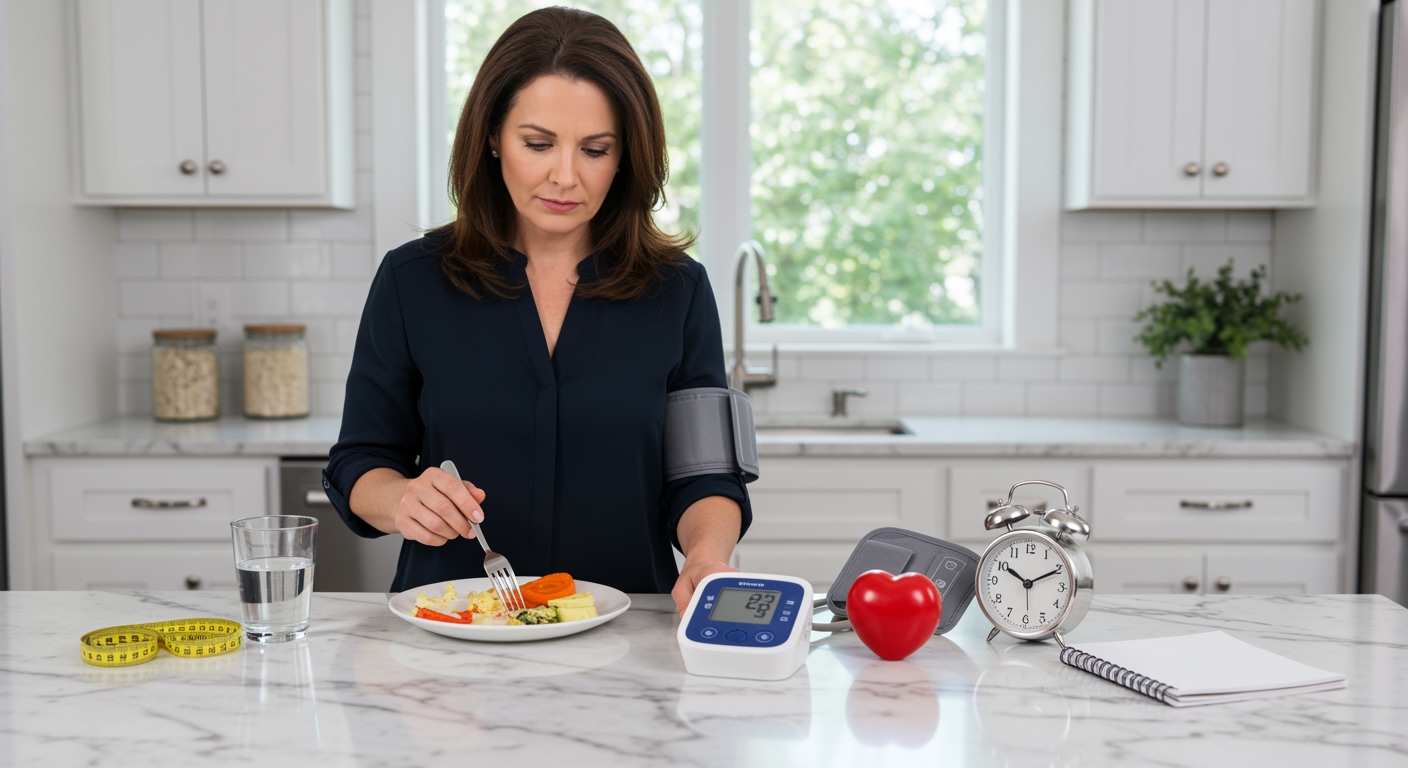✪ Key Takeaway: Eating too fast can raise blood pressure by triggering stress responses and affecting digestion.
Introduction
Your blood pressure monitor beeps with another high reading, and you wonder what went wrong with your healthy meal.
You might be asking this question because you notice your blood pressure spikes after meals, or your doctor mentioned that your eating habits could affect your cardiovascular health.
Hi, I’m Abdur, your nutrition coach, and today I’m going to explain how your eating speed directly impacts your blood pressure and what you can do about it.
How Does Eating Speed Affect Your Cardiovascular System?
When you eat too quickly, your body activates its stress response system in ways that directly impact your blood pressure.
Your sympathetic nervous system kicks into high gear during rapid eating, releasing stress hormones like cortisol and adrenaline.
These hormones cause your blood vessels to constrict and your heart rate to increase, both of which raise your blood pressure readings.
Research shows that people who eat quickly have a higher risk of developing hypertension compared to those who eat slowly.
The mechanical act of chewing slowly activates your parasympathetic nervous system, which promotes relaxation and helps maintain normal blood pressure.
✪ Fact: Fast eaters have a 59% higher risk of developing metabolic syndrome, which includes high blood pressure.
What Happens to Your Digestion When You Eat Too Fast?
Your digestive system requires adequate time to process food properly, and rushing this process creates physiological stress that affects blood pressure.
When you eat quickly, your stomach struggles to produce enough digestive enzymes and acid to break down food efficiently.
This incomplete digestion forces your body to work harder, increasing metabolic demand and raising blood pressure as a result.
Your vagus nerve, which connects your brain to your digestive system, becomes overstimulated during rapid eating.
This overstimulation can cause irregular heart rhythms and blood pressure fluctuations that persist for hours after your meal.
Poor digestion also leads to inflammation in your gut, which releases inflammatory markers that contribute to cardiovascular stress.
✪ Pro Tip: Chew each bite 20-30 times to activate proper digestion and reduce cardiovascular stress.
Does Meal Size Matter When You Eat Quickly?
The combination of eating quickly and consuming large portions creates a perfect storm for blood pressure elevation.
Large meals require more blood flow to your digestive organs, which temporarily reduces blood flow to other parts of your body.
Your heart must work harder to maintain adequate circulation throughout your body, leading to increased blood pressure.
Fast eating prevents your brain from receiving satiety signals from your stomach, causing you to overeat before feeling full.
This overeating stretches your stomach beyond its comfortable capacity, triggering stress responses that elevate blood pressure.
Studies indicate that people who eat quickly consume up to 30% more calories per meal than slow eaters, amplifying the cardiovascular impact.
✪ Note: It takes 20 minutes for your brain to register fullness signals from your stomach.
Can Slowing Down Your Eating Lower Blood Pressure?
Adopting slower eating habits can significantly reduce blood pressure and improve overall cardiovascular health.
When you eat slowly, your body produces more nitric oxide, a compound that helps relax blood vessels and lower blood pressure.
Mindful eating practices activate your parasympathetic nervous system, which promotes relaxation and counteracts stress-induced blood pressure spikes.
Research demonstrates that people who practice slow eating for just 8 weeks show measurable improvements in blood pressure readings.
Slower eating also improves insulin sensitivity, which helps regulate blood sugar levels and reduces cardiovascular strain.
The simple act of putting your fork down between bites gives your digestive system time to process food properly and maintain stable blood pressure.
✪ Pro Tip: Set a timer for 20 minutes during meals to practice eating at a healthier pace.
What Are the Best Strategies for Eating Slower?
Creating sustainable habits around mindful eating requires practical strategies that fit into your daily routine.
Start by eliminating distractions like television, phones, or computers during meals to focus entirely on your eating experience.
Use smaller plates and utensils to naturally slow down your eating pace and encourage more deliberate chewing.
Practice the “20-20-20 rule”: take 20 minutes to eat, chew each bite 20 times, and pause for 20 seconds between bites.
Engage your senses by noticing the texture, flavor, and aroma of your food, which naturally slows down consumption.
Schedule regular meal times instead of eating on the go, as rushed environments promote fast eating habits that stress your cardiovascular system.
✪ Fact: People who eat in calm environments have 23% lower post-meal blood pressure spikes.
The Bottom Line
Eating too fast absolutely affects your blood pressure by triggering stress responses, disrupting digestion, and overwhelming your cardiovascular system.
Your fork is not a shovel, and your meal is not a race – treating food with respect and patience directly benefits your heart health.
I encourage you to share your experiences with mindful eating or ask any questions about blood pressure management in the comments below.
At NutritionCrown, we use quality and credible sources to ensure our content is accurate and trustworthy. Below are the sources referenced in creating this article:
- Frontiers in Nutrition: Eating Speed and Metabolic Health
- Healthline: Blood Pressure After Eating
- PMC: Eating Speed and Cardiovascular Risk
- VA News: Eating Too Fast Health Effects





